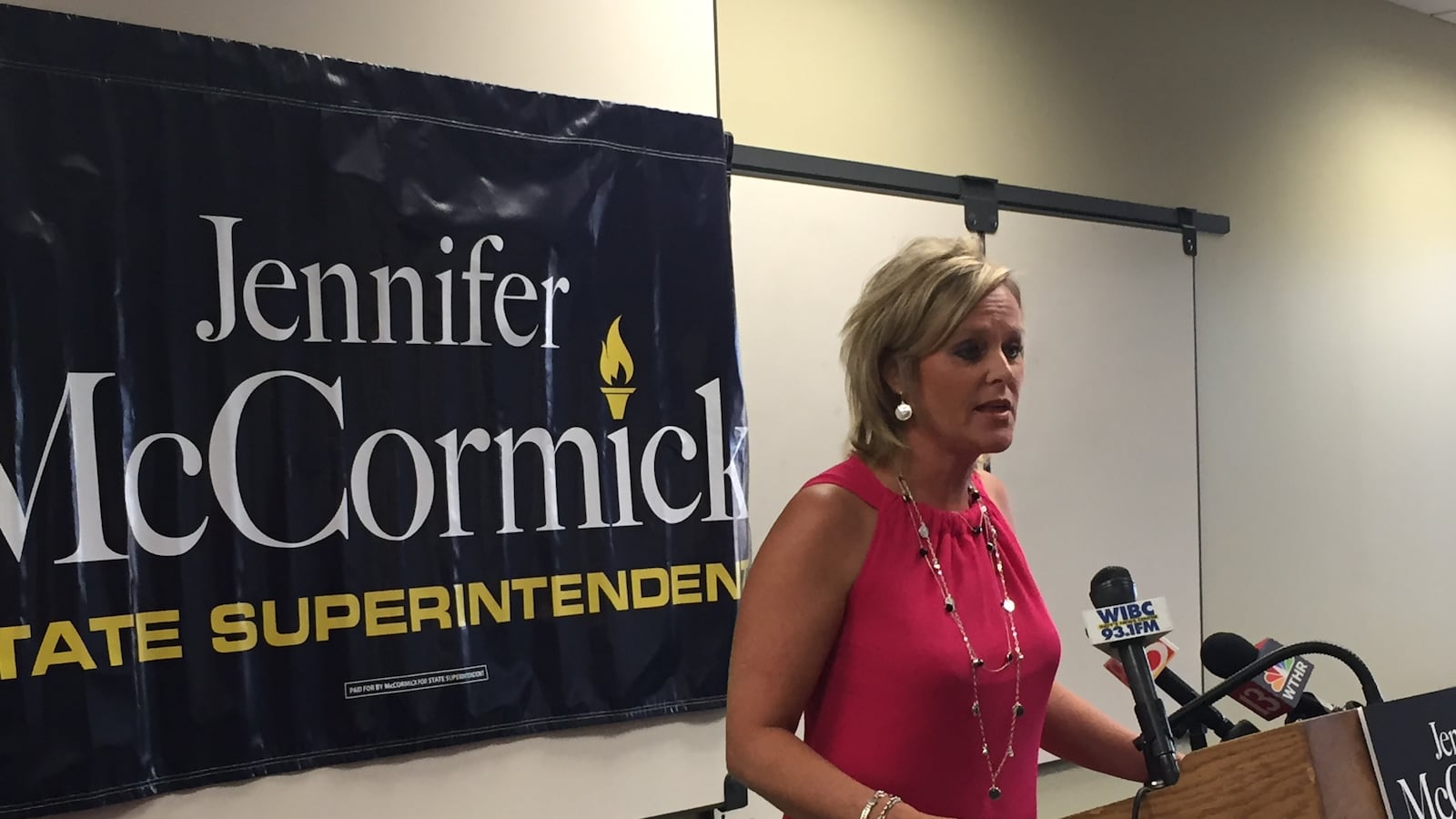Republicans who dislike Democratic state Superintendent Glenda Ritz and have invested all their hopes that Yorktown Superintendent Jennifer McCormick will defeat her in November might be in for a few surprises.
McCormick, the Republican candidate for Indiana schools chief, unveiled her long-promised plans for Indiana’s education system today, and it charts a somewhat different course than the roadmap her allies in the statehouse have followed for several years.
In fact, McCormick actually favors some of Ritz’s approaches to change course from Republican plans, like how to overhaul A-F grades for schools and add supports for teachers.
McCormick said she did back many of the initiatives put in place by Indiana’s Republican-led legislature over the past eight years, such as tougher requirements for teacher evaluations.

But, she said, “as a state, we’ve done a pretty nice job of beating up on the (teaching) profession.”
The criticism of teachers, she said, has gone too far.
“(Teachers have) heard the message loud and clear from several areas that we’re not getting the job done,” McCormick said. “And that gets exhausting for people.”
McCormick’s plan calls for changes to the state’s teacher pay system, which was overhauled in 2011 to tie pay more strongly to evaluation results and in some cases led to systems that favored one-time bonuses based on performance.
McCormick said she wants a teacher pay system that depends less heavily on evaluation results and can more easily factor in other teacher accomplishments, like how many years experience they have or whether they have earned advanced degrees. Those factors were explicitly removed from the evaluation system by the Republican-led legislature in 2011.
McCormick questioned whether bonuses really acted as incentives for teachers to push students toward better performance and encouraged good teachers to stay in the profession. Bonuses teachers get for high evaluations don’t amount to much money at all — maybe $100, she said.
“Is that program working the way it was intended to work?” McCormick said. “Given what the amounts are right now, it becomes very difficult (to make that attractive to teachers).”
On testing and A-F grades, McCormick reiterated her earlier calls to shorten state tests and change the state’s school rating system so it does not just produce a single A-F grade, but rather mimics a student “report card” by including more information.
Some of those ideas overlap with proposals from Ritz that have failed to get traction with lawmakers. But McCormick argued she would be better at building relationships and communicating with the legislature and other education policymakers because of her experience as a school and district administrator.
One of McCormick’s biggest pledges was to push for another overhaul of the state school funding system to re-examine how aid for poor children is calculated.
In 2015, the legislature changed that calculation so it is now based on how many students in a school qualify for welfare, food stamps or are in foster care. In the past, the state gauged how many poor children each district had by counting the number who qualified for the federal free and reduced-price lunch program.
McCormick was critical of that change for the resources it’s taken from some schools. Coupled with other changes to the state’s base tuition amount, it meant some districts saw far less aid, particularly those with students who needed it most like Indianapolis Public Schools and districts in Gary and East Chicago.
“We need to make sure that our schools are funded in an equitable and adequate fashion,” McCormick said. “It’s not just about the dollar-to-dollar that follows the students. We need to look at the formula with the complexity index issues.”
McCormick also responded to comments made earlier this week by Ritz and John Gregg, the Democratic candidate for governor, that school choice programs, particularly private school tuition vouchers, exacerbated school segregation.
McCormick said trying to convince Indiana lawmakers to move off the well-worn path of furthering school choice was futile.
“When you get into the funding of (vouchers) … our legislators have made the decision that that’s the route they’re going,” McCormick said. “It’s not the state superintendent who’s going to expand that or stop that.”
Chalkbeat reported Tuesday that while Indiana’s voucher program doesn’t appear to increase segregation in private schools, school choice policies, especially those without parameters that would ensure they help schools diversify, can make school segregation worse.
McCormick has previously said she supports school choice, but she’s also said she wouldn’t support some more extreme measures that some argue operate at the expense of public schools, such as a controversial voucher program some lawmakers have expressed interest in known as “education savings accounts.” Indiana doesn’t yet have such a program.
“As a public schools superintendent I understand that you have one bucket of money, and I understand that what goes in and what goes out drives a lot of decisions,” she said. “Anything that impacts those K-12 dollars we need to be smart about.”

